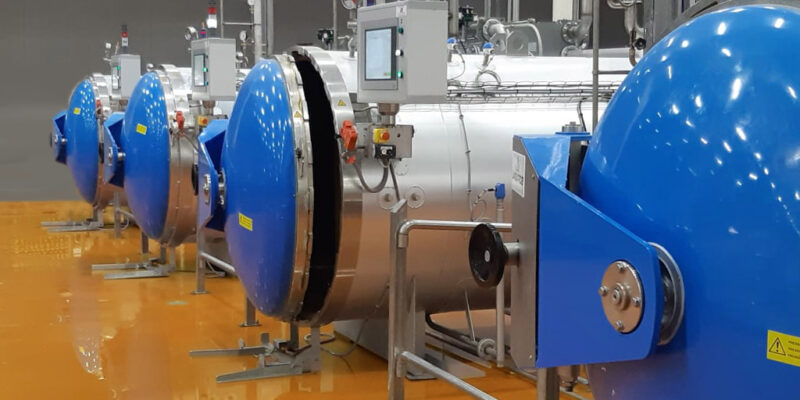FOR A CUSTOMER IN THE PET FOOD INDUSTRY, WE SUPPLIED A SERIES OF RETORTS/AUTOCLAVES
For a customer in the pet food industry, we supplied a series of retorts/autoclaves for the sterilization of pouches. These pouches, typically 85 and 100 grams, are sold either as a single product or in showboxes with a mix of products.
At the project’s outset, the customer provided us with basic information including their line’s production speed, pouch dimensions, and their sterilization needs. From this, we advised the customer to find the right solution, considering not just our machines but also the necessary surrounding items. This included discussions on the choice of packing machine—whether to use pouches made from rolls or prefabricated pouches for onsite filling—as well as the required steam boiler, cooling system, and accessories compatible with the loading system.
The customer opted for prefabricated pouches to ensure greater flexibility. The process and sterilization time and values were initially validated in our pilot plant, which helped us choose the appropriate model for the project. The factory was designed with a semi-automatic loading system, meaning the accessories for the autoclave needed to be sturdy and easily manageable by a robot. In projects with manual loading, we would opt for a simpler and lighter tray type to simplify operator handling. Should the customer wish to process cans or other containers in the future, our autoclaves can accommodate this type of packaging with different accessories. This versatility was considered in the pre-project stage to ensure optimal flexibility for the future.
In this specific instance, the steam boiler was provided by an external supplier, while the cooling system was designed by TPS and installed with a local cooling partner, all aimed at minimizing energy and water consumption and maximizing sustainability. Depending on climate and temperature requirements, the cooling water could be chilled or mixed with glycol. Given the product is sterilized, intense cooling is unnecessary, and a standard cooling system with a dry cooler was installed.
After engineering and manufacturing, the machines were delivered and installed at the customer’s facility, and utilities were connected. The autoclaves, being standalone machines, were simply connected to the required utilities. Commissioning by the TPS engineering team required some utilities to be adjusted for optimal flow. Within two days, all machines were operational, verified by empty test runs, and ready for product testing.
Recipes developed in the pilot plant were applied, ensuring the final product met the customer’s expectations without surprises. The energy efficiency promises were fulfilled. The TPS team also supported the calibration of sensors and process validation, confirming the steam/air process’s uniformity and ability to meet the targeted cycle times.
Following detailed training, the customer now successfully operates the complete system daily.

